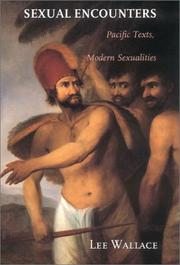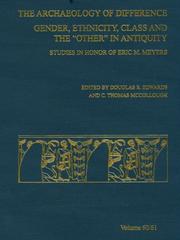| Listing 1 - 8 of 8 |
Sort by
|
Book
ISBN: 192094270X 9781920942700 1920942696 Year: 2006 Publisher: Canberra, Australia : ANU E Press,
Abstract | Keywords | Export | Availability | Bookmark
 Loading...
Loading...Choose an application
- Reference Manager
- EndNote
- RefWorks (Direct export to RefWorks)
Ethnology --- Southeast Asians. --- Pacific Islanders. --- Oceanians --- Southeastern Asians --- Asians
Book
ISBN: 144384828X 9781443848282 144382660X 9781443826600 Year: 2011 Publisher: Newcastle upon Tyne : Cambridge Scholars Pub.,
Abstract | Keywords | Export | Availability | Bookmark
 Loading...
Loading...Choose an application
- Reference Manager
- EndNote
- RefWorks (Direct export to RefWorks)
This volume investigates Pacific collections held in Australian museums, art galleries and archives, and the diverse group of 19th and 20th century collectors responsible for their acquisition. The nineteen essays reveal varied personal and institutional motivations that eventually led to the conservation, preservation and exhibition in Australia of a remarkable archive of Pacific Island material objects, art and crafts, photographs and documents. Hunting the Collectors benchmarks the importa...
Pacific Islanders --- Anthropological museums and collections --- Anthropological collections --- Anthropology --- Museums --- Oceanians --- Ethnology
Book
ISBN: 1921666323 1921666331 9781921666339 9781921666322 Year: 2013 Publisher: Canberra, Australia : ANU E Press,
Abstract | Keywords | Export | Availability | Bookmark
 Loading...
Loading...Choose an application
- Reference Manager
- EndNote
- RefWorks (Direct export to RefWorks)
"Watriama and Co (the title echoes Kipling's Stalky and Co!) is a collection of biographical essays about people associated with the Pacific Islands. It covers a period of almost a century and a half. However, the individual stories of first-hand experience converge to some extent in various ways so as to present a broadly coherent picture of 'Pacific History'. In this, politics, economics and religion overlap. So, too, do indigenous cultures and concerns; together with the activities and interests of the Europeans who ventured into the Pacific and who had a profound, widespread and enduring impact there from the nineteenth century, and who also prompted reactions from the Island peoples. Not least significant in this process is the fact that the Europeans generated a 'paper trail' through which their stories and those of the Islanders (who also contributed to their written record) can be known. Thus, not only are the subjects of the essays to be encountered personally, and within a contextual kinship, but the way in which the past has shaped the future is clearly discernible. Watriama himself features in various historical narratives. So, too, certain of his confrères in this collection, which is the product of several decades of exploring the Pacific past in archives, by sea, and on foot through most of Oceania.
Pacific Islanders --- Pacific Ocean --- Oceanians --- Ethnology --- Watriama, William Jacob, --- Islands of the Pacific --- History. --- Pacific Islands --- Pacific Ocean Islands
Book
ISBN: 1782383514 9781782383512 9781782383505 1782383506 Year: 2014 Publisher: New York : Berghahn,
Abstract | Keywords | Export | Availability | Bookmark
 Loading...
Loading...Choose an application
- Reference Manager
- EndNote
- RefWorks (Direct export to RefWorks)
The Pacific region presents a huge diversity of cultural forms, which have fuelled some of the most challenging ethnographic work undertaken in the discipline. But this challenge has come at a cost. Culture, often reconfigured as 'custom', has often served to trap the people of the Pacific in the past of cultural reproduction, where everything is what it has always been, or worse-outdated, outmoded and destined for modernization. Pacific Futures asks how our understanding of social life in the Pacific would be different if we approached it from the perspective of the futures
Pacific Islanders --- Ethnology --- Oceanians --- Social life and customs. --- Oceania --- Pacific Islaners --- Social life and cutoms. --- Pacific Islaners-Social life and cutoms. --- Ethnology-Oceania. --- Oceania-Social life and customs.
Book
ISBN: 1760463078 176046306X Year: 2019 Publisher: ANU Press
Abstract | Keywords | Export | Availability | Bookmark
 Loading...
Loading...Choose an application
- Reference Manager
- EndNote
- RefWorks (Direct export to RefWorks)
"Today, increases of so-called ‘low-skilled’ and temporary labour migrations of Pacific Islanders to Australia occur alongside calls for Indigenous people to ‘orbit’ from remote communities in search of employment opportunities. These trends reflect the persistent neoliberalism within contemporary Australia, as well as the effects of structural dynamics within the global agriculture and resource extractive industries. They also unfold within the context of long and troubled histories of Australian colonialism, and of complexes of race, labour and mobility that reverberate through that history and into the present. The contemporary labour of Pacific Islanders in the horticultural industry has sinister historical echoes in the ‘blackbirding’ of South Sea Islanders to work on sugar plantations in New South Wales and Queensland in the late nineteenth and early twentieth centuries, as well as in wider patterns of labour, trade and colonisation across the Pacific region. The antecedents of contemporary Indigenous labour mobility, meanwhile, include forms of unwaged and highly exploitative labouring on government settlements, missions, pastoral stations and in the pearling industry. For both Pacific Islanders and Indigenous people, though, labour mobilities past and present also include agentive and purposeful migrations, reflective of rich cultures and histories of mobility, as well as of forces that compel both movement and immobility.Drawing together historians, anthropologists, sociologists and geographers, this book critically explores experiences of labour mobility by Indigenous peoples and Pacific Islanders, including Māori, within Australia. Locating these new expressions of labour mobility within historical patterns of movement, contributors interrogate the contours and continuities of Australian coloniality in its diverse and interconnected expressions."
Pacific Islanders --- Indigenous people --- Labor mobility --- Mobility, Labor --- Migration, Internal --- Labor supply --- Labor turnover --- Oceanians --- Ethnology --- Indigenous peoples --- work --- labour --- migration --- Australia --- Pacific --- Indigenous peoples - Pacific. --- Employment - Conditions - Slavery and indentured labour. --- Employment - Conditions - Wages - Stolen wages.
Book
ISBN: 9811953872 9811953864 Year: 2023 Publisher: Singapore : Palgrave Macmillan,
Abstract | Keywords | Export | Availability | Bookmark
 Loading...
Loading...Choose an application
- Reference Manager
- EndNote
- RefWorks (Direct export to RefWorks)
Foreign workers.. --- Foreign workers --- Pacific Islanders --- Migrations. --- Oceanians --- Ethnology --- Alien labor --- Foreign labor --- Guest workers --- Guestworkers --- Immigrant labor --- Immigrant workers --- Migrant labor (Foreign workers) --- Migrant workers (Foreign workers) --- Noncitizen labor --- Noncitizens --- Employees --- Employment

ISBN: 1501717367 9781501717369 0801441218 9780801441219 080148832X 9780801488320 Year: 2018 Publisher: Ithaca, NY : Cornell University Press,
Abstract | Keywords | Export | Availability | Bookmark
 Loading...
Loading...Choose an application
- Reference Manager
- EndNote
- RefWorks (Direct export to RefWorks)
European literary, artistic, and anthropological representation has long viewed the Pacific as the site of heterosexual pleasures. The received wisdom of these accounts is based on the idea of female bodies unrestrained by civilization. In a revisionist history of the Pacific zone and some of its preeminent Western imaginists, Lee Wallace suggests that the fantasy of the male body, rather than of the free-loving female, provides the underlying libidinal structure for many of the classic "encounter" narratives from Cook to Melville. The subject of Sexual Encounters is sexual fantasy, particularly male homoerotic fantasy found in the literature and art of South Sea exploration, colonization, and settlement. Working at the boundaries of a number of disciplines such as queer theory, anthropology, postcolonial studies, and history, Wallace engages in subversive readings of eighteenth- and nineteenth-century Pacific voyage journals (Cook in Hawaii and a Russian expedition to the Marquesas), an argument concerning Gauguin's treatment of female figures, and a discussion of homosexuality and Samoan male-to-female transgenderism. These phenomena, Wallace asserts, demonstrate the continuity and dissonance between Western and Pacific sexual categories. She reconstructs Pacific history through the inevitable entanglement of metropolitan and indigenous sexual regimes and ultimately argues for the importance of the Pacific in defining modern sexual categories.
Homosexuality --- Heterosexuality --- Pacific Islanders --- Europeans --- Sex customs --- Customs, Sex --- Human beings --- Sexual behavior --- Sexual practices --- Manners and customs --- Moral conditions --- Sex --- Ethnology --- Sexual orientation --- Same-sex attraction --- Bisexuality --- Oceanians --- History --- Sexual behavior. --- Attitudes. --- Gauguin, Paul, --- Banks, Joseph, --- Cook, James, --- Pacific Islands --- Pacific Ocean Islands --- Discovery and exploration.

ISBN: 0897570707 9780897570701 1134828411 1138006815 1282373145 9786612373145 0203298810 9780203298817 9780415117661 0415117666 9781134828425 113482842X 9781134828371 1134828373 9781134828418 9781138006812 0415117666 9781282373143 6612373148 Year: 2000 Publisher: London : Routledge,
Abstract | Keywords | Export | Availability | Bookmark
 Loading...
Loading...Choose an application
- Reference Manager
- EndNote
- RefWorks (Direct export to RefWorks)
The Archaeology of Difference presents a new and radically different perspective on the archaeology of cross-cultural contact and engagement. The authors move away from acculturation or domination and resistance and concentrate on interaction and negotiation by using a wide variety of case studies which take a crucially indigenous rather than colonial standpoint. -- Publisher.
Social archaeology - Middle East --- Ethnoarchaeology - Middle East --- Ethnicity - Middle East - History --- Sex role - Middle East - History --- Social classes - Middle East - History --- Meyers, Eric M. --- Middle East - Antiquities --- Ethnology --- Pacific Islanders --- Ethnoarchaeology --- Ethnic archaeology --- Ethnicity in archaeology --- Ethnology in archaeology --- Archaeology --- Social archaeology --- Oceanians --- First contact (Anthropology) --- First contact with other peoples. --- Material culture. --- Cultural assimilation. --- Methodology --- First contact with Europeans --- Oceania --- Moana Nui, Te --- Moana Oceania --- Oceanica --- South Pacific --- South Pacific Ocean Region --- South Pacific Region --- South Sea Islands --- South Seas --- Southwest Pacific Region --- Te Moana Nui --- Islands of the Pacific --- Antiquities. --- Ethnicity --- Sex role --- Social classes --- Middle East --- First contact with other peoples --- Material culture --- Cultural assimilation --- First contact with Europeans.
| Listing 1 - 8 of 8 |
Sort by
|

 Search
Search Feedback
Feedback About UniCat
About UniCat  Help
Help News
News